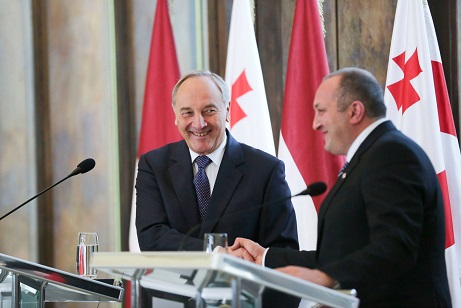Georgia-Latvia cooperation advances after Latvian President’s visit

The relationship between Georgia and Latvia is intensifying, say the leaders of both countries after meeting today.
Latvian President Andris Berzins is in Georgia and had a one-on-one meeting with Georgia’s President Giorgi Margvelashvili at the Presidential Palace in Avlabari today. There, the officials spoke about the importance of strategic cooperation between the two nations and their mutual desire to enhance bilateral cooperation.
President Margvelashvili said the assistance of Latvia as the next European Union (EU) president country was of great importance for Georgia’s Euro-Atlantic integration. Margvelashvili thanked Berzins for Latvia’s support for Georgia’s territorial integrity, sovereignty and non-recognition policy and also for its statements of support at the Baltic Assembly in Riga on November 24th.
The Georgian President noted the importance of the Latvian President’s visit to Georgia during this "crucial time” following the signing of an alliance agreement between Russia and breakaway Abkhazia, which many believed to be another step towards annexing Georgia’s occupied regions.
After the meeting, the presidents held a joint press conference where they summed their discussion.
Russia- Abkhazia treaty
The Georgian President spoke about the recent developments in Georgia’s breakaway Abkhazia region and noted Abkhazians and Ossetians should only see a future in Georgia.
I want to tell you a very simple example about what is happening in Abkhazia, which is an indivisible part of Georgia. No one is satisfied with this agreement [between Russia and Abkhazia]. Naturally the Georgian Government is not happy with this agreement but the Abkhazians themselves are anxious about it, he said.
To sum up these conflicts, [Georgians], Abkhazians and Ossetians can all live together and these groups should only see their future in Georgia as they will have a European future,” Margvelashvili noted.
Moreover, Margvelashvili believed ‘red lines’ (collective defensive lines of NATO member states), should not only involve NATO members but include countries who choose freedom, such as Georgia.
The ‘red line’ agreement meant if one country was violated, NATO would deem this as an attack on all NATO states, therefore NATO had the right to involve military forces from other member states as a way to solve the problem. This clause has only been invoked only once in NATO history; by the United States after the September 11 attacks in 2001.
Meanwhile, at today’s press conference when Margvelashvili was asked by a Reuters reporter whether negotiations should continue between Tbilisi and Moscow, he replied: "History showed that if that failed to happen, the situation will be more complicated”.
Negotiated and peaceful resolution of this conflict, of course, does not have any alternative. I would like to emphasize once again we want to internationalise this negotiation process and that is why it is important to maintain the Geneva International Discussion format where Georgian and Russian diplomats can discuss the most important problems,” Margvelashvili said.
In addition, the day before yesterday we requested to hold a UN Security Council session to discuss this issue and requested that these issues be discussed in international organisations and in all other formats where possible.
Meanwhile from the Latvian perspective, President Berzins criticised the Russia-Abkhazia agreement as "a step back”.
We should resolve any conflict collectively through peaceful ways. Latvia supports Georgia’s sovereignty and territorial integrity. The agreement, which was signed between Russia and Abkhazia, is a step back, it makes it difficult to solve this problem peacefully and casts doubt on regional stability, he said.
He also believed the signature of so-called ‘Alliance and Strategic Partnership’ treaty between Russia and de-facto Abkhazia was a continuation of the Russia-Georgia war in 2008 and he stressed the European choice of Georgia, Ukraine and Moldova should focus on the defensive sphere as this would help to make the situation in the region become more stable and predictable.
Georgia is determined to take a peaceful course of action toward conflict resolution issues. Within this course, our goal is to detach problems between our international partners, to make this issue more global and to involve many more trans-national partners in the problem resolution processes. Therefore, we should take often irrational, misunderstanding politics with Russia in a rational point of view, Margvelashvili said.
Georgia – Latvia cooperation
We paid special attention to the cooperation of Black Sea and Baltic regions. You know how important the process is of Georgia developing as a transit country; a country which connects the Caspian Sea and the Black Sea. This process should be further enhanced and participation of our Baltic friends is crucial, Margvelashvili told reporters.
The Georgian official also stated the country had implemented several reforms in compliance with its obligations noted in the Georgia-EU Association Agreement (AA), signed in June 2014.
We should achieve the very important Association Agreement agenda and we must implement many reforms to reach our goal. Therefore, we are preparing to complete the visa liberalisation process within the AA. Very important works, which should begin to be implemented this month, will tighter [Georgia’s] ties with Europe, Margvelashvili said.
The President then emphasized that Latvia’s experience in this context was unique and it could share its learnt knowledge with other countries going through similar circumstances.
Along with sharing experiences, we also [aim to] establish even closer ties with Latvia. In these terms, all agreements which will be signed by the Ministry of Foreign Affairs, agriculture and healthcare and our Latvian counterparts are very important,” President Margvelashvili said during the press conference.
We had a very intensive and productive meeting, which is proof of the bilateral interests that exists between our countries. We will also have [bilateral] meetings with different ministries and representations. This once again confirms how serious our desire is to deepen cooperation with Georgia,” he noted.
After the press conference, the Latvian President attended the Georgia-Latvian Business Forum with Prime Minister Irakli Garibashvili.
 Tweet
Tweet  Share
Share